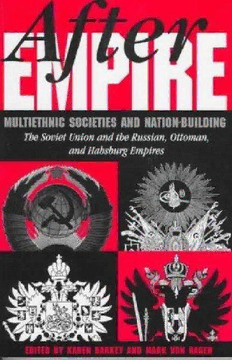
After Empire: Multiethnic Societies and Nation-Building: The Soviet Union and the Russian, Ottoman and Habsburg Empires PDF
209 Pages·1997·7.894 MB·English
Most books are stored in the elastic cloud where traffic is expensive. For this reason, we have a limit on daily download.
Preview After Empire: Multiethnic Societies and Nation-Building: The Soviet Union and the Russian, Ottoman and Habsburg Empires
Description:
The Soviet Union was hardly the first large, continuous, land-based, multinational empire to collapse in modern times. The USSR itself was, ironically, the direct result of one such demise, that of imperial Russia, which in turn was but one of several other such empires that did not survive the stresses of the times: the Austro-Hungarian Empire of the Habsburgs and the Ottoman Empire.This ambitious and important volume brings together a group of some of the most outstanding scholars in political science, history, and historical sociology to examine the causes of imperial decline and collapse. While they warn against facile comparisons, they also urge us to step back from the immediacy of current events to consider the possible significance of historical precedents.Is imperial decline inevitable, or can a kind of imperial stasis be maintained indefinitely? What role, if any, does the growth of bureaucracies needed to run large and complex political systems of this type play in economic and political stagnation? What is the “balance of power” between the center and the peripheries, between the dominant nationality and minorities? What coping mechanisms do empires tend to develop and what influence do these have? Is modernization the inexorable source of imperial decline and ultimate collapse? And what resources, including the imperial legacy, are available for political, social, and economic reconstruction in the aftermath of collapse? These are just a few of the tantalizing questions addressed by the contributors to this fascinating and timely volume.
See more
The list of books you might like
Most books are stored in the elastic cloud where traffic is expensive. For this reason, we have a limit on daily download.
